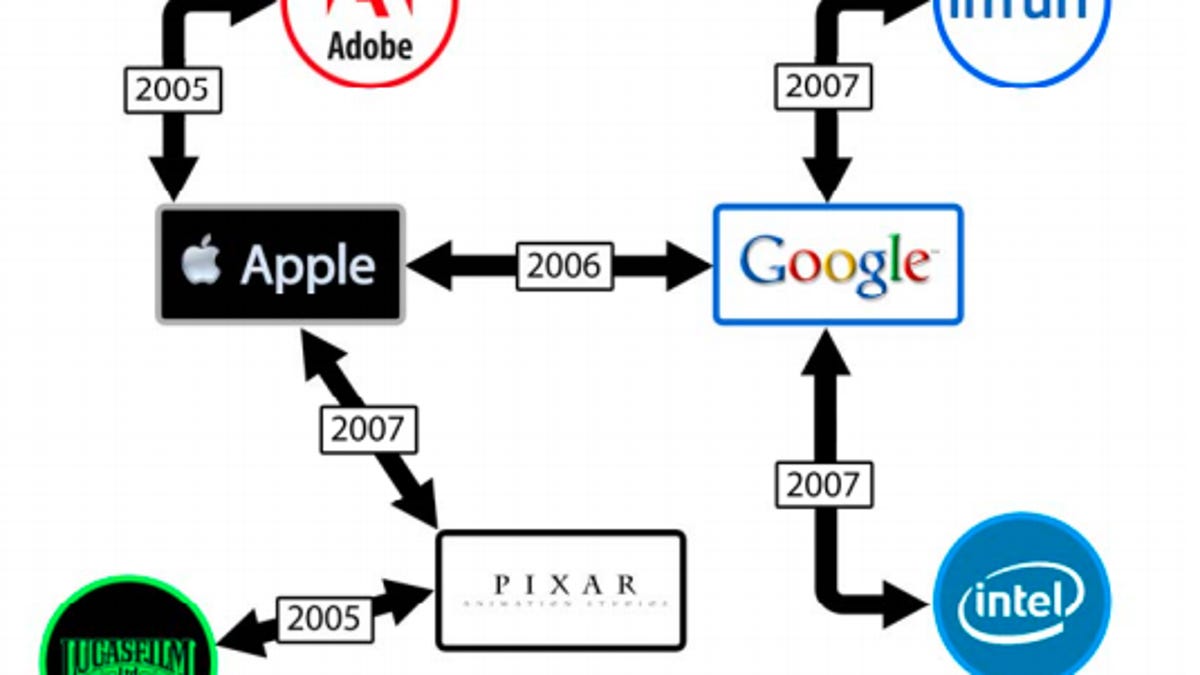Lawsuit accuses Apple, others of fixing worker pay
A new lawsuit is taking aim at Apple, Google, Adobe, Intel, and other large tech companies for allegedly conspiring with one another to lowball salaries, as well as alert others of employees seeking jobs elsewhere.

A new California lawsuit accuses Apple, Google, Adobe Systems, Intel, and other tech companies of violating antitrust laws by allegedly conspiring to fix employee pay, as well as working out "no solicitation" deals with one another.
The suit (PDF), which seeks class action status, was filed today with the California Superior Court in Alameda County and alleges that because senior executives from Adobe, Apple, Google, Intel, Intuit, Lucasfilm, and Pixar "entered into an interconnected web of express agreements to eliminate competition among them for skilled labor," affected employees from those companies are entitled to compensation.
"My colleagues at Lucasfilm and I applied our skills, knowledge, and creativity to make the company an industry leader," said Siddharth Hariharan, a former Lucasfilm employee who filed the class action suit and is listed as the plaintiff. "It's disappointing that, while we were working hard to make terrific products that resulted in enormous profits for Lucasfilm, senior executives of the company cut deals with other premiere high tech companies to eliminate competition and cap pay for skilled employees," Hariharan said in a statement.
In the complaint, Hariharan seeks restitution for lost compensation as well as treble damages for those who are a part of the suit, which includes salaried employees from the companies during January 1, 2005, to January 1, 2010.
The suit focuses specifically on the companies targeted by a 2009 antitrust investigation by the U.S. Department of Justice. That investigation, and the civil lawsuit that followed, were settled back in September of last year, with the aforementioned companies agreeing to discontinue the use of "do not cold call" lists. Nonetheless, the suit says the companies are still profiting in the aftermath of the practice.
"The DOJ has confirmed that it will not seek to compensate employees who were injured by defendants' agreements," the suit says. "Without this class action, plaintiff and members of the class will not receive compensation for their injuries, and defendants will continue to retain the benefits of their unlawful collusion."
Joseph R. Saveri, an attorney with Lieff Cabraser (the firm that's representing Hariharan's case) said the reduced competition from the companies working together cut potential employee compensation by 10 percent to 15 percent. "These companies owe their tremendous successes to the sacrifices and hard work of their employees and must take responsibility for their misconduct," Saveri said in a statement.
As the lawsuit outlines, the practice began with Pixar and Lucasfilm in 2005, before expanding to include Apple and Adobe. The connection there being Apple CEO Steve Jobs, who allegedly made the deal while he was still the CEO of Pixar. Following that, Apple is said to have entered into a deal with Google "no later than 2006" that put both companies on each other's "do not cold call" lists, effectively encouraging each side to not actively attempt to hire away staff. A year later similar deals are said to be made between Apple and Pixar, Google and Intel, and Google and Intuit.
As for the size of the class, the suit says that there are potentially "tens of thousands" affected.
Intel disagrees with the allegations in the lawsuit about recruiting practices.
"We are still evaluating the case but plan to conduct a vigorous defense," said Intel spokesman Chuck Mulloy in statement to CNET. "Intel does not believe its actions violated the law nor does the company agree with the allegations. The company settled the DOJ matter because it believes it would not harm the company or its ability to do business."
A Lucasfilm representative said "the claim is meritless," and that the company had no further comment on the pending litigation.
Apple, Google, and Pixar did not immediately return requests for comment. Representatives for Adobe and Intuit said their companies do not comment on pending litigation.
Updated at 9 a.m. PT on May 5 with comment from Intel, and once again at 9:35 a.m. PT with comment from Lucasfilm.

